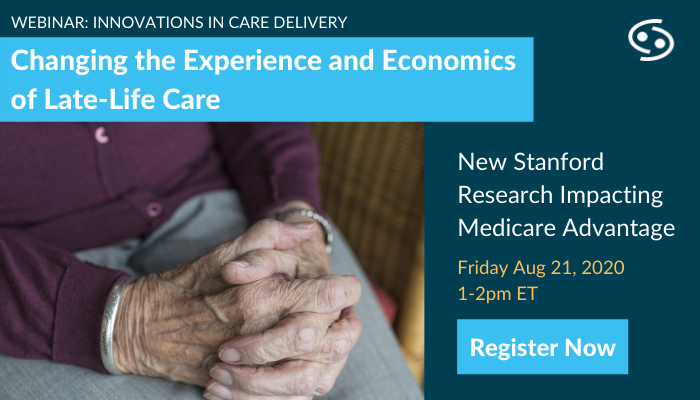for
Individuals
Better Quality of Life
Learn More
Resource

The Stanford Clinical Excellence Research Center (CERC) engaged in a multi-year research project that holistically explored the quality, cost and experience of care for older adults and the most promising, scalable and impactful ways to improve that experience.
The needs of elderly Americans in the last years of life are often inadequately met. This time of life can be stressful and costly for individuals and their families, driven by aggressive care (that may not be wanted) and use of long-term services and support.
“During an ICU rotation, I noticed how often elderly patients were admitted with injuries from falls at home. This sparked my interest in the plight of older adults,” said Francesca Rinaldo, MD, PhD, Stanford surgical resident and affiliated scholar at CERC. “In our initial research, unsurprisingly, we found that for older people, health care costs are high and satisfaction is low. Once we framed the root issues, we then found innovative solutions to greatly reduce unnecessary healthcare spending and mitigate the mounting sense of dissatisfaction.”
Social isolation, functional decline and misaligned care turned out to be the three greatest challenges facing older adults. Healthcare plans are in a unique position to drive change in our elder experience and better serve their older populations.
Addressing the problem of misaligned care, Vital Decisions’ Advance Care Planning (ACP) telehealth services is one of three exemplary innovations showcased in the research. In just 3-5 sessions, Vital Decisions’ clinical behavioral health experts work one-on-one with individuals to clarify their preferences for care, and communicate with family and care teams. It’s a comparatively small intervention that can change the trajectory of care.
The full peer-reviewed study, “Slowing Medicare Spending by Optimizing Late-Life Needs“, is published in the July-August issue of New England Journal of Medicine Catalyst, and available to subscribers.
The researchers will also be discussing the context and highlights of their work in an upcoming webinar, hosted by the association of America’s Health Insurance Plans (AHIP):
WHAT: Optimizing Late-Life Care and Spending
WHO: Researchers from the Stanford Clinical Excellence Research Center (CERC) and study authors Francesca Rinaldo, MD, PhD, Myra Altman, PhD, and Kendell Cannon, MD and Vital Decisions’ Connie Ducaine, PhD, LPC, LCADC, ACS, NCC
WHEN: 1-2pm ET on August 21, 2020
REGISTER: https://www.ahip.org/events/optimizing-late-life-care-and-spending/
What Care Elders Want, and What Actually Happens
Through extensive research, discussions with nationally recognized experts and stakeholders (providers, patients, payers, and health care executives), review of peer-reviewed literature, and observation, the Stanford team isolated Vital Decisions’ approach as a key way to address misaligned late-life care.
Physicians could have these conversations with their elder patients or their surrogate decision makers, but in reality, the time available for such conversations is often short. If asked, most older adults say they want to remain at home as their health declines and they don’t want to be a burden on their families — either functionally or financially. Unfortunately, many seniors don’t have these care preferences upheld.
In service to the individual and entire care team, and sponsored by the individual’s health plan, Vital Decisions Specialists intervene with expertise in motivational interviewing to define health goals, document them and communicate them with loved ones and care providers. Often, a family member or other caregiver may also participate in these conversations which are supplemented by use of Vital Decisions’ online tool, My Living Voice. The digital platform enables individuals to document and update their preferences, advance directive and healthcare proxy.
The impact of these interventions, which result in high participant-reported satisfaction, lower discordant care and significant savings, led the researchers to include the Vital Decisions approach as a pillar of their late-life care model.
“In the end, when advance care planning conversations do not take place, everyone suffers, from those faced with an advanced illness to those caring for them,” said Leah Puccio, Vital Decisions’ CEO. “These conversations are difficult, sensitive and personal. We get that, skillfully guiding hundreds of conversations a day, each one unique and personalized. The one constant in every life we touch is that after these conversations our patients and their families feel empowered, informed and in control of their care decisions, leading to improved health outcomes and a higher quality of life experience.”